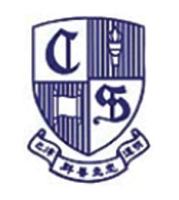| Language Policy |
The school adopts mother tongue as medium of instruction. English is used in teaching Mathematics at junior secondary levels and senior secondary levels. Split classes are arranged in English lessons. An English-rich environment is built by having English Wednesdays, taking part in Speech Festival, organising English interest classes, etc. |
| Learning and Teaching Strategies |
The school aims at effective learning and teaching, using different teaching and evaluation strategies, and life-wide learning opportunities both within and outside school. To cater for different learning needs of students, senior high school students can take three elective subjects. |
| School-based curriculum |
1. Electives: 3X. Chinese History, Chinese Literature, Economics, Geography, History, Business Accounting & Financial Studies, Biology, Chemistry, Physics, Information & Communication Technology, Visual Arts, Tourism & Hospitality Studies, Mathematics Extended Part Two (M2, Algebra and Calculus) etc.<br> 2. Curriculum highlights: <br>(1) Biblical studies in all forms to instill Christian values. Music and Physical Education in all forms to provide balanced development of students.<br>(2) Reviews and integrates the curriculum in a timely manner, with school-based material design. For example, the English curriculum emphasizes solo-verse and choral speaking, the Mathematics curriculum tries out flipped classroom on e-learning platforms in junior forms, the Computer Literacy teachers design school-based curriculum to help junior form students explore different technologies and their applications. Interdisciplinary STEAM education elements are developed at all levels in Science, Computer Literacy and Mathematics. |
| Approach to Catering for Learner Diversity |
To cater for learner diversity, teachers are well-equipped with knowledge and pedagogies of teaching students with special education needs. Lesson studies, led by core subject teachers who have completed SEN trainings, are frequently conducted to enhance the teaching and learning effectiveness of integrated education. |
| Approach to Integrated Education |
The Student Support Team, led by the SENCO and supervised by the Vice-principal, is responsible for organizing, operating and evaluating the supportive work of Integrated Education as well as drafting the School-based Inclusion Policy. The Student Support Team comprises the SENCO, SENSTs, speech therapist, counsellor, teachers and teaching assistants. The team works closely with the Counselling Mistresses and the school social workers. Besides, class teachers, subject panel heads and subject teachers draft supportive measures collaboratively for students with special educational needs. When necessary, parents, educational psychologist, etc. will attend case meetings. With the consent of parents, we collect the referral letters of secondary one students so as to identify their needs and provide early intervention. We also identify students with suspected special educational needs and refer them to further consultations of educational psychologist. The Learning Support Grant is used flexibly on hiring services for social training groups, individual and group counselling, after-school tutorials, etc. Moreover, a counsellor and teaching assistants are hired to support the team. Adjustments are provided in internal assessments, in particular, enlarging test papers, using speech-to-text software, etc. We also assist students in applying for relevant adjustments in public examination. Furthermore, our school emphasizes Home-school Cooperation. Summary of Support for Students are given to parents for updating them on the supporting service their children receive. In addition, face-to-face meetings and teleconference with parents are regularly conducted for reviewing the effectiveness of the supporting strategies. |
| Education Support for Non-Chinese Speaking (NCS) Students |
|
| Home-School Co-operation |
Working closely with parents, the school nurtures students in an all round manner so that they may grow up healthy in body, mind and spirit. |
| School Ethos |
The school adopts whole-school approach on student discipline and guidance. All classes are taken care of by two class teachers. |
| School Development Plan |
(1) Transform the school into a learning community and enhance the effectiveness of teaching and learning <br> 1. Build a professional learning community to improve the effectiveness of teaching and learning.<br> 2. Enhance students' self-directed learning ability and academic performance.<br> 3. Enhance teachers' ability to cater for students' learning diversity.<br><br>(2) Strengthening life education and enhance students' well-being<br> 1. Cultivate students' good values and characters.<br> 2. Build a caring campus culture and enhance the physical and mental health of students.<br> 3. Promote the gospel and build a positive attitude towards life in students through Christian education. |
| Teacher Professional Training and Development |
The school cultivates a sharing spirit and facilitates mutual support among teachers through collaborative lesson preparation, peer lesson observation, external and school-based professional development sessions and peer mentoring scheme. |
| Life-wide Learning |
Over 30 activity units have been set up under four categories, namely, academic, aesthetics, sports and services, including various subject interest groups, brass band, string orchestra, dancing, choir and show choir, drama, sports teams, uniform groups (Girls' Brigade and Scouts) and Christian Fellowship. |
